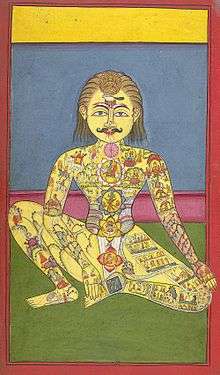Morarji Desai National Institute of Yoga
Yoga : a Hindu philosophy that teaches a person to experience inner peace by controlling the body and mind[1]
 | |
Former names | Central Research Institute for Yoga (CRIY) |
|---|---|
Motto in English | Health, Harmony and Happiness for all through Yoga |
| Type | Registered Society |
| Established | 1998 |
Officer in charge | Dr. Ishwar V Basavaraddi |
| Location |
New Delhi, Delhi, India 28°37′33″N 77°12′26″E / 28.62583°N 77.20722°E |
| Campus | Lutyens’ Zone |
| Nickname | MDNIY |
| Website | Official Web Site |
The Morarji Desai National Institute of Yoga (acronym MDNIY)[2] is an autonomous, non profit making institute,[3] acting as the nodal agency for the development and promotion of yoga culture across the country. The Institute is established by the Department of AYUSH, the Ministry of Health and Family Welfare, Government of India.[4]
Profile



The establishment of the Morarji Desai National Institute of Yoga was based on a Government of India initiative to revive the yoga culture and spread the yoga philosophy to all parts of the country. The functioning of the Institute is under the Department of Ayush,[6] the Ministry of Health and Family Welfare, India. The Institute is mandated to promote Yoga philosophy and facilitate training and advanced research on the subject.[7]
The Institute was started in 1970, in the form a hospital, opened by the now defunct Central Council for Research in Indian Systems of Medicine and Homoeopathy, under the Vishwayatan Yogashram. The hospital was later converted into an institute, by name, Central Research Institute for Yoga (CRIY) in 1976, to provide free training to people and to organize research on yoga. In 1988, the institute was further renamed as the Morarji Desai National Institute of Yoga with expanded mandates.[6]
Facilities
The Institute is housed in a campus measuring 2.818 acres, and is equipped with the amenities such as a conference hall with audio visual facilities accommodating 50 people, an auditorium with a capacity of 140 people, a library with a collection of over 9000 books on yoga and related topics, a practice hall (Kriya block) for 30 people, an academic block for classes and practices, an out-patient facility where therapists, dieticians and medical officers offer consultancy services, a laboratory with physiological and biochemical testing and research facilities, an x-ray unit and a multi media centre with audio-visual support.
Departments
Teaching Department: The faculty of MDNIY is further classified into eight sub sections, each catering to a specific branch of study such as Yoga Education, Yoga Therapy, Yoga Philosophy, Yoga and Human Consciousness, Anatomy, Physiology, Allied Sciences and Languages. The department of Allied sciences focusses on alternative medicine systems such as Ayurveda and Naturopathy as well as clinical support functions of Dietetics & Nutrition, Hospital Management and Computer Science. The Department of Languages is a teaching centre for Sanskrit, English and Hindi languages.
Yoga Education Department: The Institute offers three themes of yoga education, Diploma in Yoga Science, Certificate Course in Yoga Science for Target Group and Continuing Medical Education programme on Yoga[8][9]
Yoga Therapy and Training Department: The Institute offers yoga training and yoga therapy under the banner of this department.
Yoga Training Programs
- Foundation Course in Yoga Science for Wellness
- Health Promotion Program
- Yoga Program for Women
- Pranayama and Meditation Program
- Weekend Yoga Training Program
- Shankhaprakshalana Kriya
- Individual Therapy Session
- Children Special Yoga Program
Yoga Therapy Programs
- Hypertension and Cardio-vascular diseases
- Obesity related Health Problems
- Respiratory Disorders
- Back ache and Arthritis problems
- General Yoga Therapy
Yoga Research Department: The Department of Yoga Research is the research arm of MDNIY where the research activities are classified under two themes.
Scientific Research: The scientific research is involved with the basic science of yoga as well as its prophylactic and therapeutic uses. The department interacts with various research centres and hospitals and has set up a sleep laboratory for the research purposes.
Philosophico Literary Research: This theme follows the philosophy of yoga with emphasis on the literary aspect of the philosophy such as research on ancient texts and scriptures and the propagation of the philosophy through print and other media. The department is also engaged in a research project, Philosophy and Practices of Hatha Yoga traditions.
The Department of Yoga Research also oversees the management of several advanced yoga centres in the country, in association with various agencies such as:
- Advanced Centre for Yoga in Mental Health & Neurosciences at National Institute of Mental Health & Neurosciences (NIMHANS), Bangalore
- Advanced Centre for Yoga in Cardiovascular Diseases and Diabetes mellitus at Jawaharlal Institute of Post Graduate Medical Education and Research (JIPMER), Puducherry
- Centre for Advanced Research and Training in Yoga in Operational Stress and Performance improvement of Defence Personnel at Defence Institute of Physiology and Allied Sciences (DIPAS), Delhi
- Advanced Centre for Yoga in Respiratory Diseases and Geriatric Care at Gujarat Ayurveda University (GAU), Jamnagar
- Advanced Centre for Yoga Therapy and Research in Chest Diseases at Government Medical College, Jammu
WHO Project: The Institute is availing WHO funds for the propagation of yoga in relation to wellness and the management of common diseases through print media. The WHO project also funds the efforts of the Institute for introduction of yoga techniques into medical curriculum as well as training medical students and physicians on yoga.
Communication and Documentation Department: The Department of Communication and Documentation is the documentation hub of the Institute. It is engaged in the collection and documentation and propagation of information and knowledge base through lectures and seminars. It also stores the knowledge base digitally for preservation and future reference, regularly publishes brochures and other literature for the public and organizes efforts for participation in health exhibitions and conferences.[10]
The Institute is also in the process of setting up a Learning Resource Centre in Yoga to act as the knowledge repository of the Institute. The centre is envisaged to have a Library and Information Wing, an Audio, Visual and Electronic Media Centre and a Documentation, Communication and Publication Wing. The project is funded by WHO.
Administration Department: The department holds the general administration functions including accounts, grievance cell and public relations.
Courses
| Pada (Chapter) | English meaning | Sutras |
| Samadhi Pada | On being absorbed in spirit | |
| Sadhana Pada | On being immersed in spirit | |
| Vibhuti Pada | On supernatural abilities and gifts | |
| Kaivalya Pada | On absolute freedom | |
MDNIY conducts several courses for the general public as well as yoga trainers.[3]
- Yoga Training Programmes
- Yoga Education
- Special Programme
- Scientific Research
- Publication and Propagation
- International Activities
- Extension Activities
It also facilitates advanced research on yoga.[12]
Yoga therapy centres
The Institute manages four yoga training centres in the state of Delhi.[13]
- Yoga Therapy Centre, Vallabhbhai Patel Chest Institute, University of Delhi, North Campus, Delhi – 110 007
- Rajan Babu Institute of Pulmonary Medicine and Tuberculosis, Dhaka Colony, Kingsway Camp, Delhi – 110 009
- LRS Institute of Tuberculosis and Respiratory Diseases, Sri Aurobindo Marg, Mehrauli, New Delhi – 110 030.
- Institute of Human Behavior and Allied Sciences, Jhilmil, Dilshad Garden, Delhi – 110 095
In addition to these centres, MDNIY also assists NGOs and other agencies in setting up nodal centres at various parts of the country.[14]
Publications

MDNIY has published several books on yoga as well as taken up many publications of other yoga centres for distribution.[15]
- Yogic Management of Arthritis
- Yogic Management of Respiratory Disorders
- Yogic Management of Gynecological Disorders
- Yogic Management of Geriatric Disorders
- Yogic Management of Neurological Disorders
- Yogic Management of Psychiatric Disorders
- Yoga Training Manual for School Children
- Bi-Monthly Lecture Series
- Yoga for Common Disorders
- Yoga for Wellness by The Yoga Institute, Santacruz, Mumbai
- Yoga for Wellness by Kaivalyadhama, Lonavla, Pune
- Yoga for Wellness by Ramamani Iyengar Memorial Yoga Institute, Pune
- Yoga for Wellness by Krishnamacharya Yoga Mandiram, Chennai
- Yoga for Wellness by Isha Yoga Foundation, Coimbatore
- Yoga for Wellness by International Centre for Yoga Education and Research (ICYER), Puducherry
- Yoga for Wellness by Swami Rama Sadhak Gram, Rishikesh
- Yoga for Holistic Personality Development by Ramamani Iyengar Memorial Yoga Institute, Pune
- Yoga for Holistic Personality Development by The Yoga Institute, Santacruze (East), Mumbai
- Yoga for Holistic Personality Development by Kaivalyadhama S.M.Y.M. Samiti,Lonavala, Pune
- Yoga for Holistic Personality Development by SVYAM University, Bangalore
- A Yogic approach to Holistic Personality Development By Yoganjali Natyalayam, Puduchery
- Understanding and Development of our Personality by Prof. C. G. Deshpande, Pune
- Yoga Calendars on 10 topics ((CD) Hindi and English)
- Yoga for All (CD) (English & Hindi)
- Yoga for Women (CD) (English & Hindi)
The Institute publishes a quarterly journal, Yoga Vijnana (Science of Yoga) where articles written by experts and authorities of yoga and other relevant information are published.[16]
Gallery
See also
References
- ↑ "Yoga". Merriam-Webster. Online (2014 ed.). Merriam-Webster, Incorporated. 2014.
- ↑ "Acronym". Acronym finder.com. 2014. Retrieved July 10, 2014.
- 1 2 "Yoga In". web site. Yoga.in. 2013. Retrieved July 10, 2014.
- ↑ "India portal". web site. Govt of India portal. 2011. Retrieved July 11, 2014.
- ↑ "Vision". MDNIY. 2013. Retrieved July 10, 2014.
- 1 2 "Ayush". Web site. Department of Ayush, under the Ministry of Health and Family Welfare, Government of India. 2010. Retrieved July 10, 2014.
- ↑ "Courses". Yoga.info. 2014. Retrieved July 10, 2014.
- ↑ "Courses 1". Career 360. 2013. Retrieved July 11, 2014.
- ↑ "Courses 2". Retrieved July 11, 2014.
- ↑ "Yoga week". 2014. Retrieved July 11, 2014.
- ↑ Stiles 2001, p. x.
- ↑ "Yoga.info". web site. Yga.info. 2014. Retrieved July 10, 2014.
- ↑ "Yoga therapy centre". MDNIY. Retrieved July 10, 2014.
- ↑ "nodal centres". MDNIY. Retrieved July 10, 2014.
- ↑ "Publications". web site. MDNIY. Retrieved July 10, 2014.
- ↑ "Yoga Vijnana" (PDF). Education Research Journals.pdf. Pune University. Retrieved July 10, 2014.






